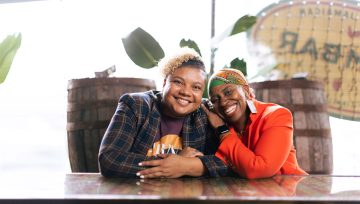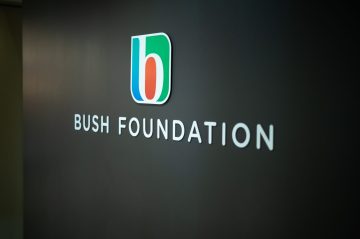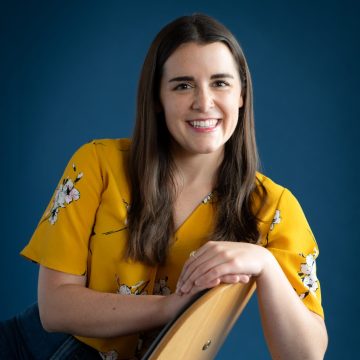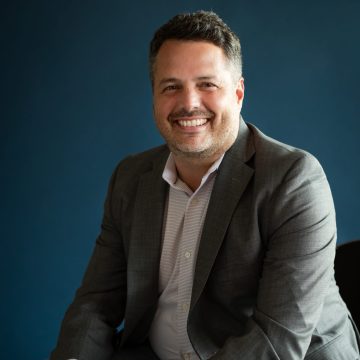Story
Community Keepers
Bush Fellows Dr. Brittany Lewis and Dr. Joi Lewis collaborate to produce transformative healing sessions for Black Minnesotans
DATE
February 24, 2022

By Harry Colbert, Jr.
Dr. Brittany Lewis (BF’20) and Dr. Joi Lewis (BF’06) are sisters.
While they do not share a parent in common, they share the same surname and certainly match Merriam-Webster’s sub-definition of “sister”: a girl or woman regarded as a comrade.
But more important than their shared last name is their shared mission: a mission seeking healing and justice for previously marginalized and historically traumatized humans of African heritage.
That work has materialized in the form of Time of Reckoning,an event series coordinated through the Healing Justice Foundation. Time of Reckoning was conceived by both Lewises following the May 25, 2020 murder of George Floyd by former Minneapolis police officer Derek Chauvin. The series brought together thought leaders and members of the community for in-person and livestreamed healing justice sessions that aimed to create Black-led policy, practice and healing agendas through monologues, community discussions facilitated by revered elders, music and more. The Bush Foundation is a funder of this work, along with the Pohlad Foundation, McKnight Foundation, GHR Foundation and The Joyce Foundation.
“Following George Floyd’s murder, I was approached by the Minnesota Department of Human Rights,” says Dr. Joi, who founded the Healing Justice Foundation in March 2020. “I reached out to Brittany and she told me she was approached by the Pohlad Foundation, so we talked about a collaboration.”
“When we got our respective asks, we naturally called each other,” Dr. Brittany says. “We said, we’ll do this if we can work together and if you [the funders] get out the way. We [the Black community] have to set the agenda.”
With those caveats in place, policy makers were invited to four town hall events to listen to community members and to ask clarifying questions. In addition to those town halls, Time of Reckoning also hosted a separate forum for policy makers at the end of the series, to assess their understanding of what they heard and give them a chance to publicly outline their commitments based on what the Black community had articulated. The sessions inspired Minnesota Governor Tim Walz and Attorney General Keith Ellison to act. Walz’s buy-in led to a proposal in the Department of Public Safety budget, Minnesota Heals, which is designed to support trauma work in the state. It also led to Hennepin County Commissioner Angela Conley’s commitment to create a county task force on reparations.
“[Minnesota Heals] came out of those town halls, and it was all from community-driven proposals,” Dr. Brittany says.
“We were engaging policy makers the whole time and we came with an ask: What are you willing to commit? What are you willing to do?” says Marcus Owens, executive director of the African American Leadership Forum, who was brought in at the planning stage of Time of Reckoning. Owens, a 2017 Bush Fellow, also pointed to positive session reports to verify the effectiveness of the forums.
For Vanne Owens Hayes (no relation to Marcus Owens), Time of Reckoning was an intergenerational time of family. A community elder, Owens Hayes is the first Black dean of the University of Minnesota School of Law and former director of the Minneapolis Civil Rights Department.
“This was about community building. It was a unique opportunity to connect new voices to older voices,” Owens Hayes says. “Time of Reckoning was helpful in breaking down a lot of walls in our community and opening new doors.”
Marcus Owens says the most important aspect of the program was making whole what was once broken.
“The added component of healing was critical,” Owens says. “It wasn’t just talking about pain and no work on healing. How they [Dr. Brittany and Dr. Joi] started and structured the series showed a level of thoughtfulness that was easily apparent to see.”
Intertwined paths
The relationship between the two women dates back almost 20 years.
When Dr. Brittany was an undergraduate student at Macalester College, it was Dr. Joi, then dean of multicultural life, who served as her mentor. Their paths would cross again after Dr. Brittany earned her doctorate and had started her career in academia.
A native of East St. Louis, Ill., Dr. Joi now calls the Frogtown neighborhood of St. Paul home. She spent more than 20 years working in higher education before following her next calling, serving as a mediator, coach, community healer and entrepreneur, which she still does today. In 2018, she authored the book “Healing: The Act of Radical Self-Care.” A 2006 Bush Fellow, Dr. Joi says her experience offered her insights into herself.
“My Bush Fellowship planted the seed in me that I could do transformative work outside of specific systems,” she says. “Now I am the founder and CEO of Joi Unlimited (a coaching and consulting firm specializing in conflict and change management) and the founder and president of the Healing Justice Foundation, on a mission to become the Red Cross for Black people. The Bush Foundation helped me see I can be a part of wealth building and healing for my community.”
A 2020 Bush Fellow, Dr. Brittany is the founder and CEO of Research in Action, a full-service research, evaluation, community engagement and racial equity consulting firm based out of North Minneapolis, MN. She is also a senior research associate at the Center for Urban and Regional Affairs (CURA) at the University of Minnesota, a former research fellow at the Minneapolis Federal Reserve Bank and a visiting assistant political science and American studies professor at her alma mater, Macalester College.
Dr. Brittany says that, in many ways, her work in research can be considered revolutionary.
“Choosing to be a researcher is probably one of the most radical things I could have done as a Black woman,” she says. “Research has been used against communities of color since the beginning of time, especially Black people. But I also had to go through the pain of the academy. The academy wasn’t built for Black women researchers. I feel like when I was in the academy my gifts were not benefitting my community. When I was teaching I felt like my gifts were only being made accessible to very privileged white people in very privileged spaces. It really wasn’t having the impact I so desired. I wasn’t happy doing what I was doing. I found I was happy working with and for my community.”
A proud resident of North Minneapolis, Dr. Brittany also served on the Metropolitan Council Livable Communities Advisory Committee, the City of Minneapolis Housing Advisory Council and the State of Minnesota Working Group on Police-Involved Deadly Force Encounters. She has also been featured in documentaries such as “Jim Crow of the North” and “A Fiery Unrest: Why Plymouth Avenue Burned.”
Support turned to collaboration when Dr. Brittany invited her former mentor to help with the Minnesota Trust Black Women and Girls Town Hall project in 2018. As part of that project, Dr. Joi sat on a health and wellness panel. “Joi was pivotal in that space,” Dr. Brittany says.
Dr. Brittany and Dr. Joi stayed connected after their time together at Macalester. “Over the years we’d randomly reach out to one another, and we were literally on the other side of the country from one another when both of us decided to quit our jobs. They weren’t feeding us spiritually,” Dr. Brittany says. “They were draining us. And our friendship at that time was about us supporting each other spiritually.”
Support turned to collaboration when Dr. Brittany invited her former mentor to help with the Minnesota Trust Black Women and Girls project in 2018. As part of that project, Dr. Joi sat on a health and wellness panel. “Joi was pivotal in that space,” Dr. Brittany says.
That fruitful collaboration and their ongoing shared mission to find healing justice for marginalized communities helped make Time of Reckoning a success a few years later.
“We said, the work has to be done by community, and we would be there to support it,” Dr. Joi explains. “This work has to be done by and with the people most affected. Their voices have to be at the forefront.”
Dr. Brittany adds, “What was clear is that how we engaged with community had to be different.”
For both, this community-based healing justice approach has helped them make a difference and has inspired future work together. Their bond of sisterhood, forged almost 20 years ago, is strong — and will continue benefiting their communities in decades to come.
Harry Colbert, Jr. is the managing editor of MinnPost, joining the newsroom in January 2022. Prior to that, he was North News’ editor-in-chief. That publication was the recipient of three Minnesota Society of Professional Journalists awards and five 2021 Minnesota Newspaper Association first-place awards, including the individual award for best column. Colbert is the recipient of an additional four Minnesota Newspaper Association awards, three National Newspaper Publishers Association Merit Awards, and three National Association of Black Journalists Salute to Excellence nominations.
Chris McDuffie, born and raised in St. Paul, MN, is the founder and visionary behind Chris McDuffie Photography. Chris became interested in photography while studying Business and Marketing Education at the University of Minnesota, which ultimately led his entrepreneurial spirit to start his own photography business shortly after graduation. He’s since been fortunate to land jobs with companies including: Activision, Cargill, Fairview, North Memorial Hospital, Minnesota Timberwolves, Target, TCF, ESPN, Nike, Bumble, GQ, and the New York Times. Chris has been recognized by the MN Fashion Awards in 2015, and the Beautiful Humans Award in 2017.
Continue reading
-

News
Opportunity to work with us
As part of our office move later this year, we are exploring possibilities for the build out of the ground floor of the building. We are in the early stages of this and considering different types of operating models and potential partnerships.
-

Staff note
Coordinating the work of our contact hub
We aim to be radically open in all that we do, and that includes being more accessible to more people and sharing what we learn along the way.
-

Staff note
Making every dollar work through impact investing
We have benefitted from the experience of other funders as we developed our impact investing approach. Now we are paying it forward and sharing what we have done and what we have learned.